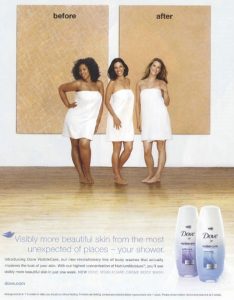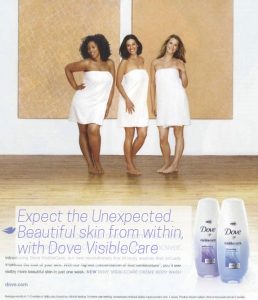Before:

The advertisement of Dove’s new body wash highlights the issue of skin colour, while trying to promote societal norms of being whiter and fair. The quote from the original advertisement states “visibly more beautiful skin from the most unexpected of places – your shower”. A woman of noticeably darker skin is standing on the left under the ‘before’ section, while another woman with tanned skin in the centre, and a caucasian woman on the right under the ‘after’ section. By using this specific body wash, it could possibly alter your skin colour to become fair almost instantly in a week (stated in the ad in small font). Body shaming can be also seen in this ad. The woman of colour is larger in body size compared to the caucasian, who is slimmer and supposedly more attractive when it comes to societal standards.
I chose this ad as it is related to what we had learnt in this course, intersectionality and the lack of women of colour in the mainstream media. Intersectionality is used to understand discrimination in race, sexual orientation as well as social class. In the media, women of colour are constantly portrayed as disadvantaged, and it fails to incorporate them the same as white women are. It therefore perpetuates the social reproduction of inequality between gender and race. Women therefore feel the constant need to have pale skin as it provides a sense of superiority. This is linked to the problem of Eurocentric views and representation in our media today, as well as the history of colonialism in the past. In the past, fair skin meant that he/she was from a wealthy family that did not have to do manual labour jobs, and were able to take care of their skin well without having to go under he sun. Skin colour should not represent a particular culture or identity.
After:

In my jammed ad, I removed the “before” and “after”, and changed the description of the ad to “Expect the Unexpected. Beautiful skin from within, with Dove VisibleCare.” Being beautiful should not be defined through skin colour or skin texture, it should not be because of using a whitening body wash to “feel beautiful”, but more of having a beautiful personality from within. The women of different skin colour exhibits a great example of diversity, therefore I did not remove them from the ad. Body representation promotes confidence especially for curvy/broad women that have been misrepresented constantly in the media. In my opinion, this could be a better advertisement to promote Dove instead of the original picture.
From a feminist perspective, women should not be used as objects in advertising and should instead fight for equality of women in the mainstream media. Traditionally, men dominated the advertising industry, while the ratio of male and female workers in the industry were heavily imbalanced. When women entered the industry, they were portrayed as a commodity and this has been a vicious cycle since then. Ads in the 1950s showcased female house-wife stereotypes and gender roles such as cleaning, cooking and child bearing. The Women’s Movement gained recognition for fighting against sexism and wanting the freedom to vote as well as equal opportunities for education and career. Although the advertising industry has experienced a shift by trying to remove the objectification of women in ads, it is still prominent in digital and social media advertisements (eg. Instagram and Facebook models). As our generation advances into the technological world, I hope to see a transformation of advertisements that includes all genders, races and diversity.
Reference:
Image:
http://www.dailymail.co.uk/femail/article-1390312/Soap-giant-Dove-accused-racism-body-wash-advert.html
(Word count: 601)